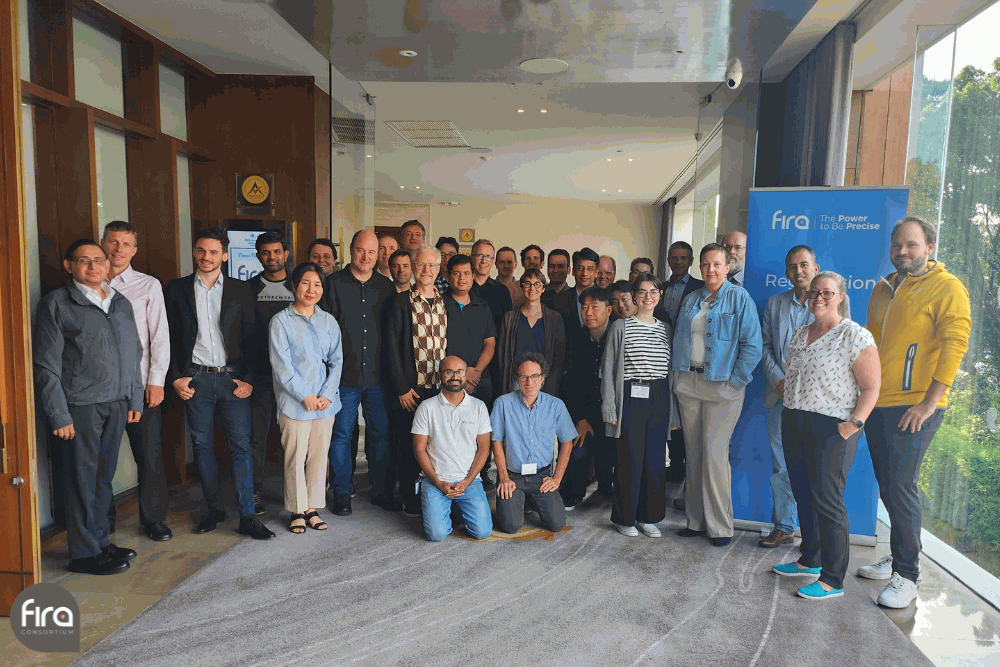
FiRa® Consortium was founded in 2019 to help transform the way people experience interconnectivity and advocate for the widespread adoption of ultra-wideband (UWB) applications. During its formation, FiRa determined the most effective way to structure the consortium was through a board, working groups, and committees.
Three working groups – the Technical Working Group, the Compliance & Certification Working Group, and the Marketing Working Group – were established in FiRa’s bylaws. Since then, three additional working groups have been created: the Regulatory Working Group, the Requirement Working Group, and the Security Working Group. We’ll explain more about our working groups shortly.
About Working Groups
A working group is a formally defined group of people that are focused on a cross-functional outcome. It’s inherent in a working group’s structure to require a committed effort from its participants and provide clarity with an eye toward a desired outcome. For a working group to be effective, it needs to have an elected leader, a clear purpose, and agreed-upon communication channels.
Working collaboratively is not only a necessity in the workplace but is also key to an organization’s development. In fact, according to the analytics firm Frost & Sullivan, successful collaboration at work can improve innovation by 30%. Working groups can also get things done. A Stanford study found that those who work in a collaborative environment are over 50% more effective at completing tasks than those who work independently.
Working Groups at FiRa
As we mentioned earlier, FiRa has six working groups and the board oversees their strategic direction. Each FiRa working group has a charter that outlines its responsibilities. We also have two committees – the Working Group Steering Committee and the Legal Advisory Committee – as well as various tiger teams created to solve specific issues. Here’s a look at our working groups and committees.
Working Groups
- Requirement Working Group (RWG) – Proposes, develops, and maintains use cases utilizing UWB in various vertical markets and details their high-level requirements. The RWG also prioritizes these use cases and defines FiRa’s roadmap based on the organization’s objectives and market trends.
- Technical Working Group (TWG) – Develops and maintains all the technical specifications for the organization that enable FiRa UWB use cases and are the basis for the FiRa Certification Program. Recently, the TWG formed two sub-groups to focus on different areas of the FiRa technical specifications allowing each to develop at an accelerated pace.
- Core Sub-Group – Responsible for developing and maintaining the FiRa technical specifications that are implemented by the UWB subsystem.
- Framework & Profile Sub-Group – Responsible for developing and maintaining the FiRa technical specifications that are generally implemented on a host processor.
- Security Working Group (SWG) – Develops and maintains security-related requirements for approved use cases and provides best practices and implementation guidance in technical specification development and certification.
- Compliance and Certification Working Group (CCWG) – Builds upon and assists in refining FiRa’s Technical Specifications by developing, validating, and maintaining its test specifications, test policies, and Certification Program. CCWG also oversees the activities of FiRa’s Authorized Test Labs.
- Regulatory Working Group (ReWG) – Develops the FiRa regulatory strategy and liaises with other standards organizations and regulatory bodies to establish and encourage regulatory frameworks that allow market access to FiRa UWB use cases and devices.
- Marketing Working Group (MWG) – Responsible for technological deployment to the market and ensuring the growth of UWB adoption. The MWG also oversees FiRa communications, FiRa branding, and coordinating industry awareness of FiRa’s UWB technologies through events, media, analyst relations, social media, collateral, and personal and industry engagements.
Committees
- Working Group Steering Committee – Coordinates the activities of the different working groups and acts as a forum where information can be shared across groups. WGSC also oversees the planning and release of specifications and is responsible for the policies, procedures, and process documents that span working groups.
- Legal Committee – A forum for providing legal input from sponsor members to the governing documents and processes of the organization.
Each FiRa working group typically has two chairs who take on the role for one year. You can learn more about FiRa’s structure and view all our current working group chairs here.